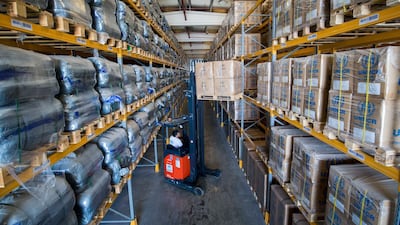The head of the UN refugee agency in the UAE has paid tribute to the country’s humanitarian relief efforts since its formation in 1971.
Toby Harward said that recent efforts to alleviate suffering in conflict-ravaged South Sudan and famine-hit Somalia proved the commitment of the UAE's global aid efforts.
The comments came in a wide-ranging interview with state news agency Wam and also touched on the turmoil in Syria, Yemen and Somalia.
Mr Harward pointed to the presence in Dubai of United Nations High Commissioner for Refugees global stockpile warehouses as a clear example of the UAE’s assistance efforts. Established in 2003 at International Humanitarian City, they are the world’s largest and account for 50 per cent of the body’s global capacity, he said.
“The presence of the warehouses in a strategic city such as Dubai enables us to reach sea and airports, which facilitates our response to various crises and emergencies around the world in less than 72 hours. The warehouse contains essential relief items to help more than 200,000 people,” said Mr Harward, head of the UNHCR office in the UAE.
"In 2016 alone, 21 emergency shipments were sent from Dubai to Tanzania, Yemen, Ecuador, Ethiopia, Sudan, Somalia and other countries," he added, noting that one of the most remarkable contributions so far this year was the provision of assistance to more than 100,000 refugees fleeing violence in South Sudan to Uganda.
Princess Haya financed a shipment of tents, blankets and mobile kitchens worth more than Dh1.5 million, while in May, Sheikh Mohammed bin Rashid, Vice President and Ruler of Dubai, loaned a Boeing 747B aircraft to fly aid to the region.
_____________
Read more:
Ruler of Dubai loans plane for aid shipment to South Sudanese refugees
UAE telethon to help Somalian children facing starvation raises Dh165 million
_____________
Mr Harward also praised the “For You Somalia” campaign launched by the President, Sheikh Khalifa, in April to give starving Somalis food, water and medicine and help them survive their third famine in 25 years.
Turning to the entrenched conflict in Syria, Mr Harward lauded the UAE initiative to take in 15,000 Syrians over five years and said it was the most important project they were working on with authorities here. The UAE is not a signatory to the 1951 Refugee Convention and is not legally bound to accept refugees but separately still hosts about 250,000 Syrians, many of whom came after the conflict erupted in 2011.
“However,” he continued, “the huge scale of the Syrian displacement crisis requires new solutions to share responsibility and ease the burden on Syria’s neighbours.
“UNHCR leads on the subject of the return of refugees to their countries, in cooperation with other UN organisations and partners. When the time is right, we hope that the UAE will actively participate in supporting reconstruction of infrastructure and other associated development projects.”
Mr Harward also praised Sheikha Jawaher bint Mohammed Al Qasimi for her support. Sheikha Jawaher, wife of Dr Sultan bin Mohammed Al Qasimi, the Ruler of Sharjah, is the UNHCR Eminent Advocate for Refugee Children and also chairperson of The Big Heart Foundation.
Mr Harward said that she has helped - on a personal level and through the foundation - about 800,000 refugees and internally displaced people through financial support to the tune of about US$22 million.
This year has been designated the Year of Giving by Sheikh Khalifa, and many humanitarian initiatives have been launched. One was the Humanitarian Accelerators programme, started by Sheikh Mohammed bin Rashid in June. This initiative bids to help aid organisations and improve the flow of humanitarian aid through the use of new technology.
“The UNHCR is excited at the prospects offered by the Humanitarian Accelerators. Two of the four challenges to be addressed by the programme directly address key issues identified in last year’s UN General Assembly summit on refugees: the need to provide both education and livelihoods to refugees,” said Mr Harward.


